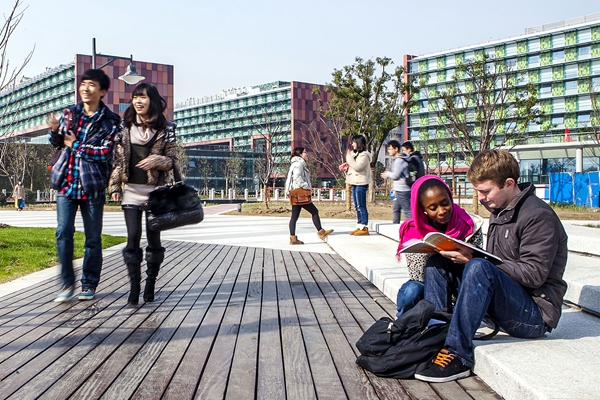US, UK still top Chinese study sites
|
|
|
A survey of 6,217 students who plan to study abroad, or their parents, found that the United States remains the top choice, with 50 percent preferring the US, up from 46 percent last year. [File Photo] |
US President Donald Trump’s arrival in the White House and Brexit in the United Kingdom have not lessened the appeal of these countries among Chinese students choosing an overseas education destination, according to a new report.
A survey of 6,217 students who plan to study abroad, or their parents, found that the United States remains the top choice, with 50 percent preferring the U.S., up from 46 percent last year.
It is the third consecutive year the country ranked No. 1 in the annual Report on Chinese Students’ Overseas Study, the latest of which was released on Tuesday.
The UK, which voted to leave the European Union last year, was the second-most popular destination, as it has been for three years.
The survey, by Vision Overseas Consulting Co and Kantar Millward Brown, was conducted in over 40 cities in February and March.
Some of Trump’s policies, including visa restrictions, are thought to have influenced international students and prospective immigrants. In a survey by five US higher education associations in February — covering around 250 U.S. colleges and universities — 38 percent reported a drop in foreign applications for the fall 2017 term — Middle Eastern students down the most — The Atlantic reported on Saturday.
Although China was not directly affected by the travel ban, 25 percent of universities saw undergraduate applications from China decline and 32 percent had fewer Chinese graduate student applications, the report said.
According to the Ministry of Education, over 540,000 Chinese students were studying in the U.S. last year, making it one of the largest source countries for international students.
“We have noticed the influence of Trump’s policy and conducted an internal survey of our clients months ago,” said Sun Tao, executive president of Vision Overseas Consulting.
“We did feel the concerns and worries of parents, but many of them stick to their choices in the U.S.”
In the survey, 51 percent of respondents said international political events did not affect their choices, and only 7 percent said they would change their choices of overseas study countries, Sun said.
The education level, overall national power and national culture have been the main factors in Chinese students’ and their parents’ choice of destination countries, the survey added.
“In addition, the full effect of the proposed U.S. visa restrictions have not become clearer, but they will raise the threshold for immigrants to stay and work in U.S.,” said Yu Zhongqiu, deputy head of Vision Overseas Consulting.
He added that the proposed restrictions require immigration applicants to have an annual income no less than $110,000, “quite difficult for new graduates to meet”.
In the survey, 73 percent planned to work in China after graduation, compared with only 57 percent last year.
“More students than before go overseas to broaden their vision and enrich their experiences, and intend to return home,” Yu said.
